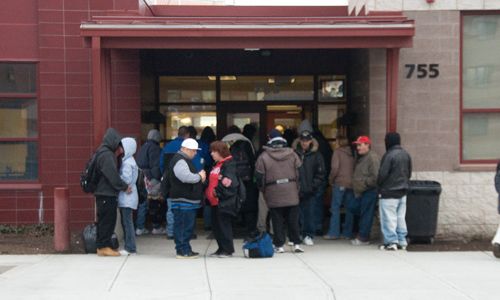During his campaign for Massachusetts governor — and after — Charlie Baker made homelessness a cornerstone issue.
“Some of our toughest challenges have been ignored and lost amid the successes,” Baker said in his inaugural address. “Or have become the equivalent of kicking a can down the road because they’re not politically convenient or easy to fix.”
Among the challenges: hundreds of families housed by the state in hotels and motels. This week, Baker proposed in his budget a $20 million fund to keep low-income families off the streets. And he announced an overall shift in policy.
At his budget press conference, Baker laid out the seemingly intractable problem.
“Simple truth of the matter is at a point in time when family homelessness has been falling nationally, it’s been increasing in Massachusetts,” the governor said. “To the point where the amount family homelessness in Massachusetts is a human tragedy that clearly must be rethought and reconsidered with respect to how these families are served.”
The Baker administration estimates there are 5,000 families living in Massachusetts hotels, motels and shelters, with much of the cost falling to taxpayers. A recent report from the federal government says Massachusetts ranks third most – just behind New York and California – in the number of people in homeless families.
Baker’s Health and Human Services Secretary Marylou Sudders describes the administration’s new approach.
“Working with expert providers, we will invest in family homeless prevention strategies that provide flexible, wraparound services to families at risk,” Sudders says.
Here’s what that means: Baker wants to send out teams to help each family develop a plan before they become homeless. The caseworkers would help the families access services like child care, job training, rental assistance and substance abuse treatments.
UMass Boston Public Policy professor Donna Friedman says it could work.
“If part of their plan is to ease the eligibility and ease the application process and coordinate across programs so there’s one application and also the resources don’t drop off too fast,” Friedman says. “That probably will make a big difference for many, many families.”
It should be said, Baker is not proposing a hike in funding. The governor hopes that by keeping families in their homes he can save the state money on shelters, hotels and motels.
“These reforms will not only cut down on the cost to the state, but cut down on the terrible toll that homelessness takes on parents and their kids,” Baker says.
It’s a promise we’ve heard before. In 2008, Gov. Deval Patrick promised to eliminate family homelessness in five years. He wanted to set up an early warning system to catch households on the brink of homelessness — and then intervene quickly with services. In other words – pretty much what Baker is proposing. So what happened?
“It was at the same time the great recession hit,” says Kelly Turley of the Massachusetts Coalition for the Homeless.
Turley says it was just bad timing. She says the number of families needing shelter jumped.
“And so even just to provide those basic services took a lot more resources than they had anticipated,” she says.
And at the same time, the state’s tax revenues took a hit. And that meant less money for prevention.
Playing a key part in all of this is Massachusetts’ right to shelter law. The state must provide emergency shelter for any family that’s eligible.
As the number of families needing it went up, the cost also went up and up and up. Soon the system was maxed out and the Patrick administration put families in hotels and motels. Peter Galliardi of Springfield-based HAP Housing testified at a State House hearing last year.
“There have been three massive waves of effort in the last several years,” Galliardi said. “And each time we have succeeded in reducing the number and each time they’ve refilled and then some. It’s worse than the myth of Sisyphus. Not only do we go back up the hill but the hill gets higher.”
The Patrick administration in 2012 tightened restrictions for who could get shelter. Families needed to show they were homeless. By sleeping on a beach, for instance, or in a train station – and snapping pictures, in some cases, to prove it.
“Over multiple administrations there has been a deep interest in homeless and a deep concern,” Turley says. “But there hasn’t been a deep enough political will to tackle homelessness.”
It is a lot to tackle, according to a recent report from the Citizen’s Housing and Planning Association. More than 60,000 Massachusetts families are at risk for homelessness.
